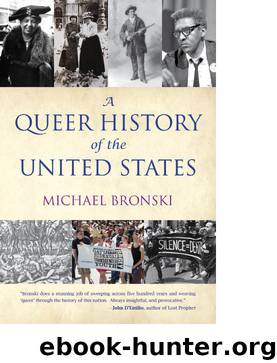A Queer History of the United States by Michael Bronski

Author:Michael Bronski [Bronski, Michael]
Language: eng
Format: epub
Tags: General, History, Social Science, Sociology, United States, Lesbian Studies, Gay Studies
ISBN: 9780807044650
Publisher: Beacon Press
Published: 2011-05-10T07:31:35+00:00
Eight. Sex in the Trenches
It is impossible to overestimate the effect of World War II on American culture, and in particular on lesbians and gay men. The United States entered World War II, which had been ongoing since September 1939, after the Japanese attacked Pearl Harbor in December 1941. This decisive turning point in U.S. history reordered American social life and mores, public and private space, and virtually all social interactions having to do with gender and sexual behavior.
The country’s entrance into the war radically transformed the domestic economy into a booming war economy, ending the Depression. The war economy not only provided much-needed jobs for Americans—the unemployment rate dropped from 17.2 percent in 1939 to 4.7 percent in 1942 and 1.2 percent in 1944—but also stimulated production of manufactured goods and increased farm production. As military-related industries such as shipyards, munitions plants, and aircraft manufacturing factories thrived, they provided employment for millions of women and men and drew workers to move from their towns and cities of birth. Between 1941 and the late 1960s, more than five million African Americans moved to urban areas, a shift that greatly helped facilitate the work of the civil rights movement of the 1960s.
These changes posed fundamental questions of citizenship. Throughout American history, full citizenship—the ability to fully partake in the obligations of governance, including voting and defending the nation, as well as to receive entitlements, such as equal protection under the law and access to state-sponsored programs—was influenced by a variety of factors. These included race, ethnicity, and religious affiliation as well as gender, gender expression, and sexual behavior. The enormous challenges that the United States had faced since the turn of the century, including waves of immigration, the rise of cities, the Great Depression, and World War I, had redefined citizenship. It was now a society more tolerant of racial, ethnic, and religious differences and one that was striving, however imperfectly, to embrace social and personal freedoms.
Download
A Queer History of the United States by Michael Bronski.epub
This site does not store any files on its server. We only index and link to content provided by other sites. Please contact the content providers to delete copyright contents if any and email us, we'll remove relevant links or contents immediately.
| African-American Studies | Asian American Studies |
| Disabled | Ethnic Studies |
| Hispanic American Studies | LGBT |
| Minority Studies | Native American Studies |
Cecilia; Or, Memoirs of an Heiress — Volume 1 by Fanny Burney(32558)
The Great Music City by Andrea Baker(32018)
Cecilia; Or, Memoirs of an Heiress — Volume 2 by Fanny Burney(31956)
Cecilia; Or, Memoirs of an Heiress — Volume 3 by Fanny Burney(31940)
We're Going to Need More Wine by Gabrielle Union(19045)
All the Missing Girls by Megan Miranda(16023)
Pimp by Iceberg Slim(14506)
For the Love of Europe by Rick Steves(14121)
Bombshells: Glamour Girls of a Lifetime by Sullivan Steve(14073)
Talking to Strangers by Malcolm Gladwell(13370)
Norse Mythology by Gaiman Neil(13363)
Fifty Shades Freed by E L James(13239)
Mindhunter: Inside the FBI's Elite Serial Crime Unit by John E. Douglas & Mark Olshaker(9339)
Crazy Rich Asians by Kevin Kwan(9290)
The Lost Art of Listening by Michael P. Nichols(7506)
Enlightenment Now: The Case for Reason, Science, Humanism, and Progress by Steven Pinker(7311)
The Four Agreements by Don Miguel Ruiz(6763)
Bad Blood by John Carreyrou(6621)
Weapons of Math Destruction by Cathy O'Neil(6279)
